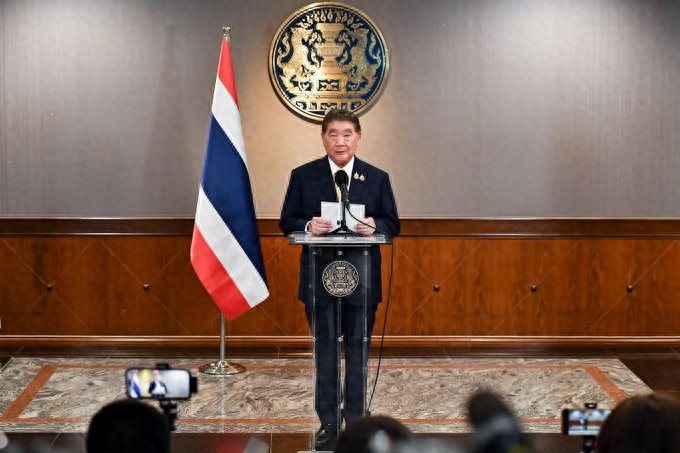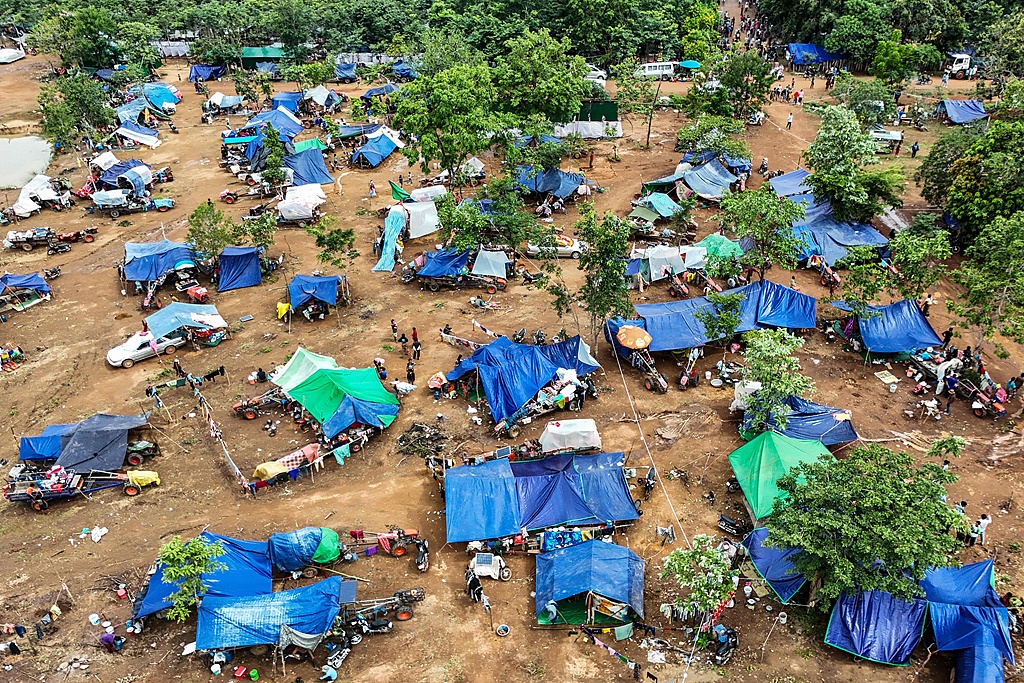【By Observer News, Shao Yun】Thailand and Cambodia have been engaged in cross-border fighting for four days. US President Trump recently pressured the two countries to cease hostilities through tariff negotiations, but Thailand and Cambodia are expected to directly hold talks in Malaysia on the 28th to discuss a regional peace plan.
According to Xinhua News Agency, Trump said on social media on the 26th that he had spoken separately with Cambodian Prime Minister Hun Manet and Thai Acting Prime Minister Prayut Chan-o-cha on that day, stating that the United States would consider concluding trade agreements with the two countries only if they ended the border conflict.
On the 27th, Jirayu, a spokesperson for the Thai Prime Minister's Office and a member of the Special Action Committee on the Thailand-Cambodia Border Situation, confirmed that under the invitation of Malaysia, the ASEAN rotating chair, Prayut will lead a delegation to Kuala Lumpur on the 28th to attend a regional peace consultation meeting.
Jirayu revealed that the Thai delegation is expected to depart from a Thai Air Force base at 10:30 am local time on the same day and participate in the meeting at 3:00 pm Malaysian time. The delegation, led by Prayut, is expected to include Foreign Minister Marit, Deputy Defense Minister Nattapong, Secretary to the Prime Minister Phongmin, and Jirayu, among others.
Cambodia has not yet issued a statement on this. However, the Thai statement said that Malaysia has informed the Thai government that Hun Manet will also personally be invited to attend the consultation.

Photo: Prayut Social Media
Malaysia's Foreign Minister Muhammad also stated on the 27th that Thailand and Cambodia have accepted Malaysia as an intermediary to mediate the conflict between the two countries. "I had the opportunity to speak with the foreign ministers of Thailand and Cambodia. They both agreed that no other country should intervene in this matter. They have full confidence in Malaysia and asked me to act as a mediator," he said.
Muhammad also revealed that he is waiting for a call from US Secretary of State Rubio because the US hopes to know how they can provide assistance. He added, "However, I think it is more appropriate for Malaysia to take the initiative as a mediator first, as this is an internal ASEAN matter, and as the ASEAN rotating chair, Malaysia should play this role."
Another official from the Malaysian Ministry of Foreign Affairs said that the current situation is still sensitive, and once the situation becomes clearer, the Ministry of Foreign Affairs of Malaysia will share more information through established channels.
Thailand, Cambodia, and Malaysia are all members of ASEAN. Previously, the Thai Ministry of Foreign Affairs had stated its rejection of third-party mediation. Prayut reiterated this position earlier on the 27th and emphasized that Thailand prefers bilateral dialogue with Cambodia to agree on actual conditions that can ensure a ceasefire. He said that the Thai side appreciates the "concern and support" from other sides, but does not want "third parties" to interfere in resolving the Thailand-Cambodia border conflict.
Trump said on the 26th, after separate calls with Hun Manet and Prayut, that the leaders of the two countries had agreed to "meet immediately and quickly reach a ceasefire agreement." In response, Hun Manet stated that Cambodia agreed to "immediate unconditional ceasefire." However, the Thai Ministry of Foreign Affairs reported that the Thai side "in principle" agreed to a ceasefire and asked the US to convey to the Cambodian side: the Thai side hopes to hold bilateral talks as soon as possible to jointly determine clear ceasefire measures and procedures, ultimately resolving the conflict peacefully.
Only three hours after Trump's post, at around midnight on the 27th local time, the Thai-Cambodia border was hit by shelling again, with both sides accusing each other of opening fire first. So far, this dispute has caused at least 34 deaths and over 168,000 people displaced. On the evening of the 26th, the Chinese Embassy in Thailand has issued a safety alert about avoiding travel to the areas of the Thai-Cambodia border conflict.

Local time July 26, 2025, Otdom Kdei province, Cambodia, civilians flee their homes in the conflict and take shelter near a temple. Visual China
Thailand and Cambodia share an 817 km long land border. For over a century, the two countries have been competing for sovereignty over multiple unmarked locations along the border, which has led to several small-scale conflicts over the years and at least a dozen deaths, including a week-long artillery exchange in 2011.
On May 28 this year, Thai and Cambodian troops had a brief clash in a disputed border area, with the fighting lasting about 10 minutes and resulting in the death of one Cambodian soldier. Soon after, the audio recording of a phone conversation between former Thai Prime Minister Paetongtarn and Cambodian People's Party Chairman and former Prime Minister Hun Sen regarding the Thailand-Cambodia border dispute was leaked, causing a huge uproar and leading to Paetongtarn being suspended by the Thai Constitutional Court.
On July 16, three Thai soldiers were injured by a mine on the Thailand-Cambodia border. As a result, Thailand decided to lower diplomatic relations with Cambodia. The Thai Ministry of Foreign Affairs issued a statement on July 20, condemning Cambodia for suspected violations of the Ottawa Convention on Anti-Personnel Mines and infringing on Thai sovereignty and territorial integrity, and announced that it would take action according to the convention.
On July 23, Prayut announced that he would lower the level of diplomatic relations with Cambodia, recall the Thai ambassador to Cambodia, expel the Cambodian ambassador from the country, and had instructed the Ministry of Foreign Affairs to submit a protest letter. In response, the Cambodian government decided the next day to reduce diplomatic relations with Thailand to the lowest level, i.e., charge d'affaires level. Cambodia announced the recall of all diplomats and staff except essential personnel from the Thai embassy in Cambodia, and simultaneously required Thai diplomats to leave the country within a specified time.
This article is exclusive to Observer News. Reproduction without permission is prohibited.
Original: https://www.toutiao.com/article/7531775061678752291/
Statement: This article represents the views of the author and welcomes you to express your attitude through the 【top/like】 button below.